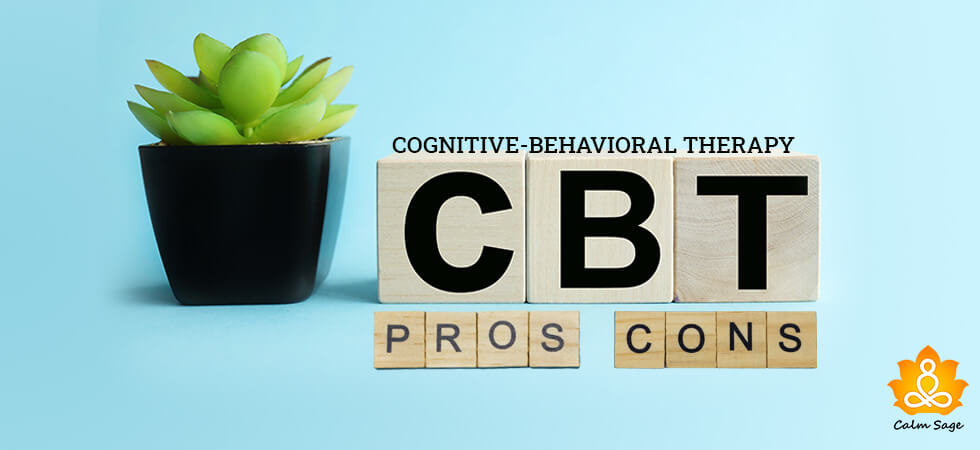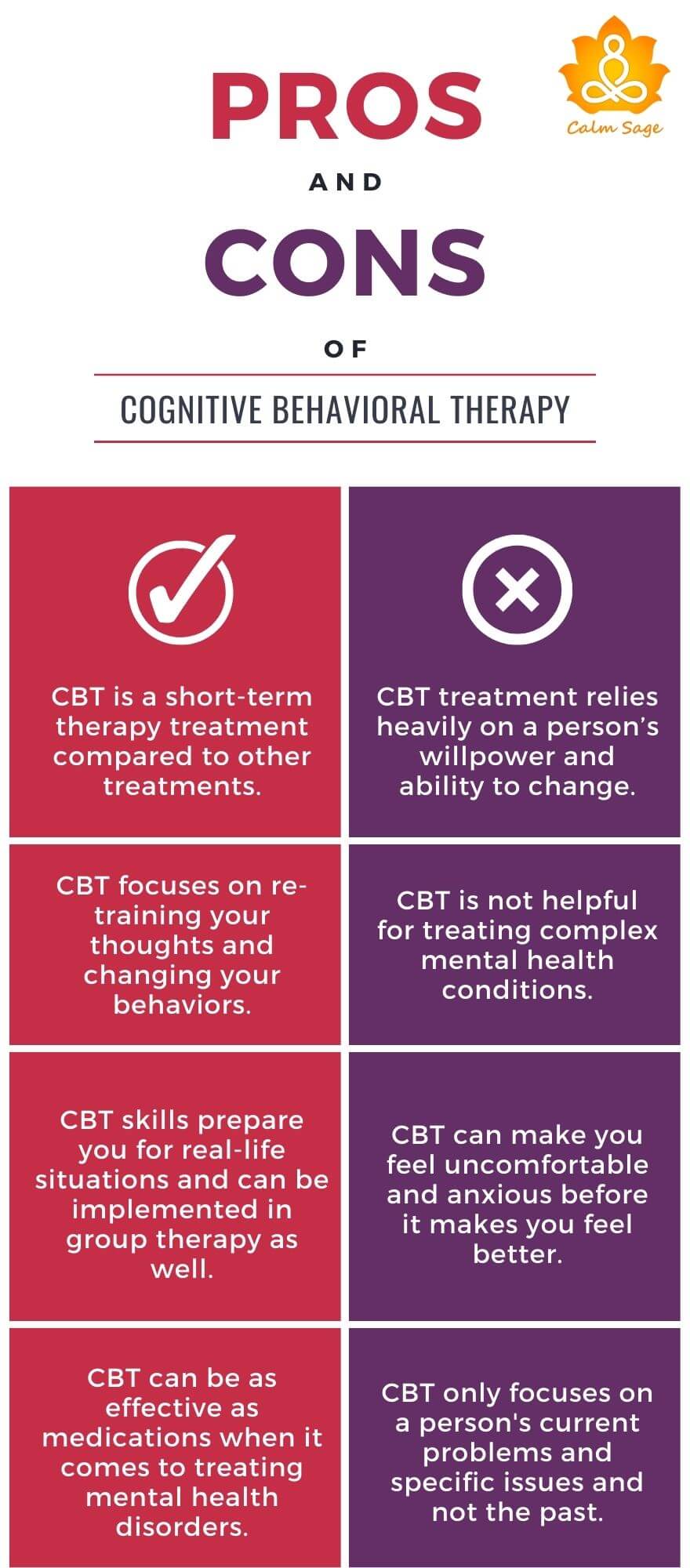Published In
Therapy

The Pros & Cons Of Cognitive Behavioral Therapy (CBT)
One of the most commonly preferred treatments for mental health disorders and related conditions, cognitive-behavioral therapy provides a combination of behavioral and talk therapy to help people reframe their negative thoughts into positive ones. In this article, we’ll explore some of the strengths and limitations of CBT.
Let’s begin with a brief overview of what cognitive-behavioral therapy is.
Cognitive-behavioral therapy or CBT is a type of psychotherapy treatment that aims to help people identify their negative thought patterns and change them into positive ones. This therapy treatment focuses on reframing the thinking process that can contribute to depression, anxiety, and other mental health-related conditions.
CBT can be used in treating conditions such as:
- Addiction
- Anger issues
- Anxiety
- Bipolar disorder
- Depression
- Panic disorders
- Eating disorders
- Stress
- Phobias
Among others. CBT is a goal-oriented therapy that requires the therapist to play an active role in the treatment process. The therapist will work with you to reach the goals you and your therapist establish in the beginning.
Nonetheless, there are some problems with cognitive-behavioral therapy that you need to know. While it is one of the most preferred treatment options, there are some limitations of CBT treatment.
Cognitive Behavioral Therapy Pros & Cons


List of the Pros of CBT Therapy
1. CBT is a short-term therapy treatment compared to other treatments.
People who choose CBT treatment usually spend 30-60 minutes per session, depending on their problem. In CBT treatment, you’re required to have a session with a therapist once a week or twice a week for at least 2 weeks. The treatment usually lasts for 10-12 sessions.
Exposure therapy, one of the treatments in CBT, might take longer to complete. There are some people, however, who complete their treatment in less than 10 sessions while some people might take months or years to complete.
2. CBT focuses on re-training your thoughts and changing your behaviors.
During CBT, the therapist focuses on five primary areas; situations, thoughts, emotions, feelings, and behaviors. A session aims to let the person seeking therapy know that all these aspects are connected. CBT is a goal-oriented therapy process and is based on a person’s real-life experiences.
Whatever their current issue is, they are taught to understand their thinking process and reflect on their past experiences while working toward reframing their thoughts and feelings and changing their behavior if the same situation arises in the future.
3. The skills learned in CBT prepare you for real-life situations.
CBT is a skill-based approach where you learn effective and healthy coping strategies which can be used in any real-life situation you come across even after your therapy has ended. By learning how to cope with real-life anxiety and stress, you also learn to become resilient which can only lead to a positive outcome in your life.
These healthy coping mechanisms can make it easier for you to deal with low self-esteem, negative thinking, stressful situations, and challenges you might face in your future. With CBT, you learn to look at the bigger picture and learn how to effectively manage your stress and anxiety in real life.
Related: How to Deal with Your Negative Thoughts? 5 Easy Ways to Overcome Them
4. CBT can be implemented either individually or in group therapy.
CBT is one of the most commonly used psychotherapy treatments that can be implemented either in a one-on-one session or in a group therapy setting. It has a structured and focused approach that can be delivered via self-help books and other mediums, unlike other therapy approaches.
Related: Weighing The Pros & Cons Of Group Therapy
5. CBT can be as effective as medications when it comes to treating mental health disorders.
While there are medications available to treat mental health disorders, there have been some researches that show the CBT might be more if not as effective as medications in treating mental health disorders. CBT, unlike medications, can also have a long-lasting impact even after the treatment ends.
This therapy is recommended as the first approach when it comes to treating mental health conditions. There are some conditions that medications alone cannot treat; in such cases, CBT along with medications can be beneficial.
Related: Therapy vs. Medication: The Best Choice For Your Mental Health Condition
List of the Cons of CBT Therapy
1. CBT treatment relies heavily on a person’s willpower.
CBT is collaborative work and each person involved in the treatment must be invested in it for the therapy to work. CBT is a treatment that depends very heavily on the patient’s willpower. If either the patient or the therapist is unwilling to create mutual goals, plan for the future, or work on the homework, CBT is less likely to work.
For CBT to work, one must commit to the process because while the therapist can aid and help, they cannot make the issues vanish without the cooperation of the person seeking help.
2. CBT is not helpful for people with learning disabilities or complex mental health conditions.
CBT has a structured and focused approach that might not work on people with learning disabilities or complex mental health conditions. CBT works to reframe the thought process of a person from negative to positive. With complex mental health disorders or phobias, CBT might not be helpful.
3. CBT can make you feel more anxious and stressed before it can make you feel better.
CBT requires you to expose your vulnerabilities, face difficult emotions, and confront challenging feelings and thoughts. During the first few sessions, you might feel anxious and uncomfortable confronting your issues. While it is okay to feel such emotions, there is a possibility that CBT might make you feel worse before it makes you feel better.
The result of CBT might not show themselves after the first few sessions and more often than not, people find it easier to quit before they feel more uncomfortable and vulnerable than before.
4. CBT only focuses on current problems and specific issues.
One of the disadvantages of CBT is that it only addresses the current issues you’re facing or some specific issues you might need resolving. The approach aims to break the negative thinking pattern and reconstruct the thinking pattern into something positive. However, CBT fails to address the whys of the issues.
For example; due to a child’s parent (one or both) abandoning them has caused them to develop a hoarding disorder. CBT will only focus on solving the hoarding problem but will fail to address the cause of the hoarding i.e., childhood abandonment.
5. CBT focuses on the person’s ability to change themselves.
The crux of the matter in the end when it comes to CBT treatment is that a person must be willing to change for the treatment to work. If a person’s ability to change their behaviors and thoughts is absent, CBT will not work as thoroughly as expected. If someone is not willing to reframe or re-train their thinking, behaviors, and feelings, CBT will not have the desired result.
CBT comes with homework and self-analysis. If a person is unwilling to self-analyze their behaviors and thoughts and refuses to work on their homework, then CBT will remain ineffective.
Get Matched With a Counselor Now
In Conclusion
While it is one of the most effective psychotherapy treatments used to treat various psychological disorders, there are some problems with cognitive behavioral therapy. If you feel like you’ll benefit from CBT treatment, contact your mental healthcare provider but keep in mind the limitations of CBT as well.
Related: Starting Therapy? Here Are The Things You Need To Know
I sincerely hope these above CBT pros and cons helped you understand how this approach works regarding the treatment of mental health problems.
If you have any queries or need any assistance, you can connect with us on our social media pages or write to us at info@calmsage.com.
Take care of yourself and stay safe.
Next Read:
Top 10 Online Therapy and Counseling Programs
10 Best Online Therapy for Services For Kids
Debunking the Top 10 Myths of Therapy and Online Therapy For You
